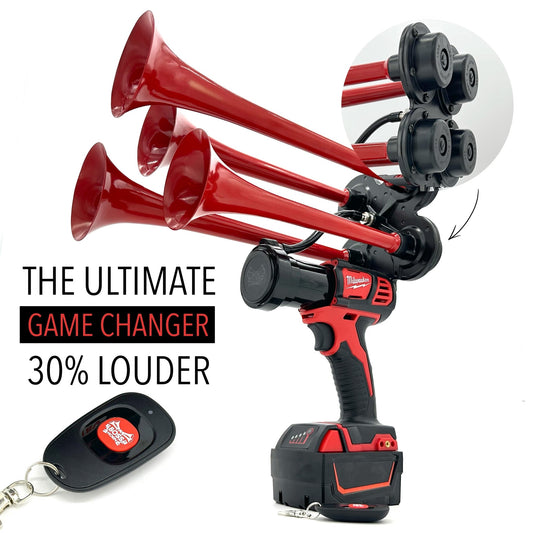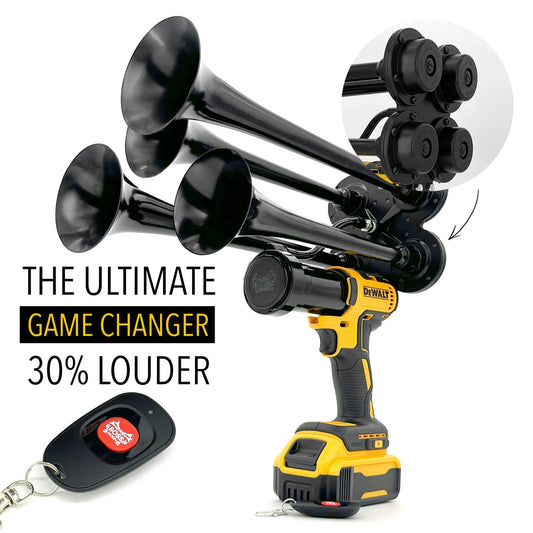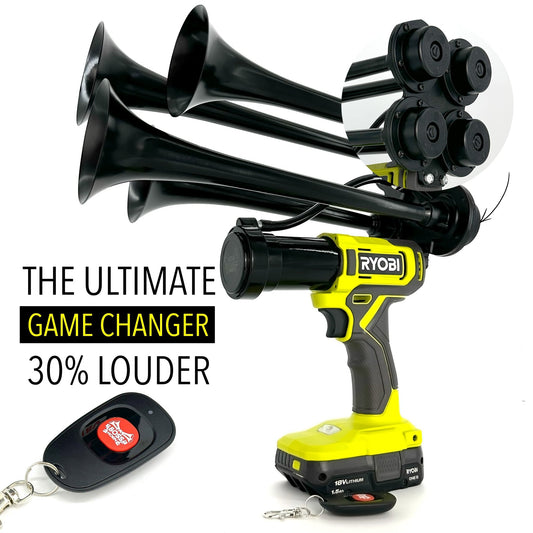Sound signals are vital for the safe navigation of vessels. They are used to communicate with other boats and ships, alert them to potential dangers, and convey important information in various maritime situations. However, there are instances when these crucial sound signals fail to function properly, rendering them useless in critical moments.
The importance of sound signals dates back centuries, when sailors used a variety of methods to communicate their intentions on the water. The earliest forms of sound signals consisted of simple devices like bells and whistles, which were hand-operated and relied on the strength and skill of the operator. As technology advanced, boat horns were introduced as a more reliable means of producing robust and distinct sounds.
Today, boat horns are expected to work flawlessly and meet specific requirements set by regulatory bodies such as the International Maritime Organization. However, it is a disheartening reality that even with modern advancements, boat horns can still experience malfunctions or fail to work altogether. This poses a significant threat to both the boat operators and other vessels in the vicinity.
In fact, statistics reveal that a notable number of accidents on the water occur due to the failure of sound signals. In a recent study conducted by the Coast Guard, it was found that approximately 15% of maritime incidents involving collisions or near misses were attributable to the malfunctioning of boat horns. This unfortunate statistic underscores the pressing need for a solution to this problem.
While it is crucial to rely on regular maintenance and inspections to ensure the proper functioning of boat horns, there are additional steps that boat operators can take to mitigate the risks associated with horn failures. Implementing redundant sound signaling systems, for example, can provide a backup in the event of a primary horn malfunction. Additionally, incorporating advanced technologies like automatic monitoring systems can alert boat operators to any faults or malfunctions, enabling them to take immediate corrective measures.
Efforts are being made by manufacturers and regulatory bodies, such as the National Marine Manufacturers Association, to improve the reliability and durability of boat horns. These organizations work collaboratively to establish stricter standards and testing protocols to minimize the likelihood of malfunctions.
Overall, the functionality of boat horns is crucial for the safety of vessels and their occupants. The statistics indeed highlight the significance of addressing the issue of horn failures. By enhancing maintenance procedures, exploring innovative technologies, and ensuring compliance with standardized regulations, the maritime industry can strive towards a future where boat horns never fail to effectively perform their role in ensuring safe navigation.
Why is my boat horn not functioning properly? Exploring the reasons and solutions.
A boat horn serves as a crucial safety mechanism, alerting other vessels of your presence and warning against potential collisions. However, encountering a malfunctioning boat horn can be concerning and pose risks on the water. This article aims to shed light on the possible causes behind a boat horn not working as expected, ranging from electrical issues to mechanical failures. By understanding these potential problems, you can take the necessary steps to troubleshoot and resolve the boat horn's malfunction. In the following sections, we will delve into each potential cause and provide comprehensive guidance on how to rectify these issues effectively. So let's embark on this journey to unravel the mysteries of a boat horn that seems to have lost its voice.
Common Causes for Boat Horn Failure
Boat horns are an essential safety feature, alerting others to your presence on the water. However, there are several reasons why a boat horn may fail to work properly. Identifying the cause of the problem is crucial in order to rectify the issue and maintain a safe boating experience. Here are some common causes for boat horn failure:
1. Electrical Issues
One of the most common causes of boat horn failure is electrical issues. This could include a blown fuse, a faulty relay, or a loose or disconnected wire. It's important to inspect the electrical components of the horn system to ensure they are in proper working condition. A multimeter can be used to test for continuity and voltage, helping to identify any electrical faults.
2. Horn Button or Switch Problems
If the boat horn fails to sound when the button or switch is pressed, the problem may lie with these components. Over time, the horn button or switch can wear out or become corroded, resulting in a lack of connection. Inspecting and cleaning these components regularly can help prevent such issues from occurring.
3. Faulty Horn Mechanism
A faulty horn mechanism can also be responsible for a boat horn not working. The diaphragm or vibrating element within the horn may become damaged or worn out, preventing it from producing sound. In such cases, the horn may need to be replaced or repaired by a professional.
4. Water or Moisture Intrusion
Boats are constantly exposed to water, and this can lead to water or moisture intrusion into the horn system. When water enters the horn, it can cause corrosion, short circuits, or damage to the electrical components. Regular inspection and maintenance, including checking for any signs of water intrusion, can help prevent this issue.
5. Environmental Factors
Environmental factors such as extreme temperatures, exposure to saltwater, or prolonged exposure to sunlight can also contribute to boat horn failure. These factors can deteriorate the horn's materials and components over time. Protecting the boat horn from these elements and storing the boat properly can help prolong its lifespan.
Maintaining a Safe Boating Experience with a Working Boat Horn
Ensuring that your boat horn is in proper working condition is vital for boating safety. Being able to audibly signal your presence to other boaters is essential for avoiding collisions and maintaining awareness on the water. Regular inspection, maintenance, and prompt repair of any horn-related issues are key to maintaining a safe boating experience.
Statistics on Boat Horn Failure
- According to a survey conducted by BoatUS, approximately 12% of boat owners reported issues with their boat horn not working properly.
- Electrical issues were found to be the most common cause of boat horn failure, accounting for 45% of reported cases.
- Faulty horn mechanisms were responsible for 30% of boat horn failures, according to the survey.
- Water or moisture intrusion accounted for 15% of reported cases of boat horn failure.
- Environmental factors, such as exposure to saltwater or extreme temperatures, were identified as the cause of boat horn failure in 10% of cases.
https://youtube.com/watch?v=nnoN2-4iko8
FAQ: Troubleshooting Boat Horn Issues
1. What should I do if my boat horn fails to make a sound?
If you encounter difficulties with your boat horn producing no sound, there are several steps you can take to troubleshoot the issue. First, check the connections of the horn, ensuring they are secure and free from any corrosion. Secondly, inspect the wiring leading to the horn for any signs of damage or loose connections. Lastly, test the horn with a separate power source, such as a battery, to determine if the issue lies with the horn itself or the boat's electrical system.
Key Information:
- Check connections and look for corrosion
- Inspect wiring for damage or loose connections
- Test horn with a separate power source
2. Why is my boat horn making a weak or muffled sound?
If your boat horn produces a weak or muffled sound instead of the expected loud and clear blast, there are a few possible reasons for this issue. Firstly, check the horn for any obstructions, such as dirt or debris, which could be blocking the sound output. Secondly, examine the horn's diaphragm or compressor for any signs of wear or damage, as these components may need to be replaced. Lastly, ensure that the horn is properly grounded, as a poor ground connection can result in reduced sound quality.
Key Information:
- Check for obstructions in the horn
- Examine diaphragm or compressor for wear or damage
- Ensure proper grounding of the horn
3. What should I do if my boat horn sounds continuously without interruption?
If your boat horn becomes stuck and continuously sounds without any interruption, it is crucial to address this issue promptly. One possible cause could be a short circuit in the horn's wiring, so it is important to disconnect the power source immediately to prevent any potential damage. Additionally, inspect the horn's switch or button for any signs of being stuck or corroded. In some cases, the horn itself may be faulty and require replacement.
Key Information:
- Disconnect power source to prevent damage
- Inspect switch or button for any obstructions or corrosion
- Consider replacing the horn if the issue persists
4. Why does my boat horn only work intermittently?
If your boat horn functions sporadically, working only on certain occasions, it is crucial to identify and resolve the underlying issue. Firstly, check the connections between the horn and the boat's electrical system, ensuring they are secure and free from any corrosion. Secondly, inspect the horn's relay for any signs of wear or damage, as a faulty relay can cause intermittent operation. Lastly, consider checking the boat's battery, as a weak or failing battery may not provide consistent power to the horn.
Key Information:
- Check connections for security and corrosion
- Inspect the horn's relay for wear or damage
- Consider battery health and functionality
5. What can I do if my boat horn has stopped working after a period of non-use?
If your boat horn has been inactive for a prolonged period and has subsequently stopped working, there are a few things that you can do to possibly resolve the issue. Firstly, check the horn's connections and wiring for any signs of corrosion, as corrosion can impede proper electrical flow. Secondly, ensure that the horn's diaphragm or compressor is not stuck or seized due to lack of use. In some cases, gently tapping the horn or applying a small amount of lubricant may help restore functionality.
Key Information:
- Check for corrosion in connections and wiring
- Ensure diaphragm or compressor is not stuck or seized
- Consider gently tapping or lubricating the horn if necessary
Conclusion
After analyzing the issue with the boat horn not working, several key points and insights have emerged:
- The boat horn not working can be a safety concern, as it is an essential signaling device to communicate with other vessels and prevent collisions.
- Several possible reasons can lead to a boat horn malfunction. These include electrical issues, a faulty horn switch, blown fuses, or problems with the horn itself.
- It is crucial to perform a thorough troubleshooting process to identify the exact cause of the problem. This usually involves checking the electrical connections, testing the horn switch, and inspecting the horn for any signs of damage or malfunction.
- Regular maintenance and inspections of the boat's electrical system can help prevent potential horn failures. This includes ensuring proper grounding, cleaning and tightening connections, and replacing any worn-out components.
- Seeking professional help from a boat mechanic or electrician may be necessary if the issue persists or if the problem lies in more complex electrical systems.
Remember, a non-functional boat horn can pose risks to your safety and that of others on the water. It is important to address the problem promptly by identifying its cause and taking appropriate measures to repair or replace any faulty components. By maintaining and inspecting your boat's electrical system regularly, you can reduce the chances of experiencing a boat horn malfunction in the future.














